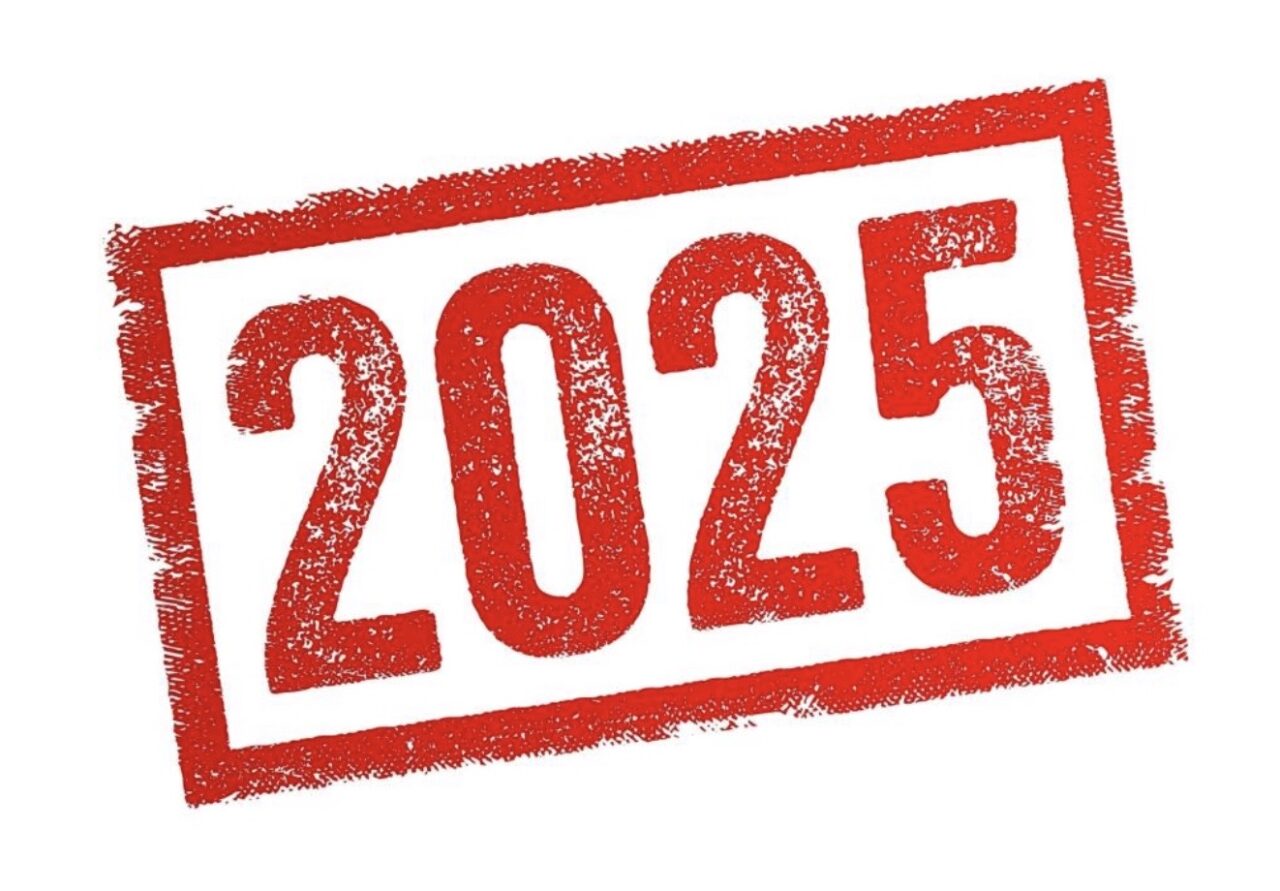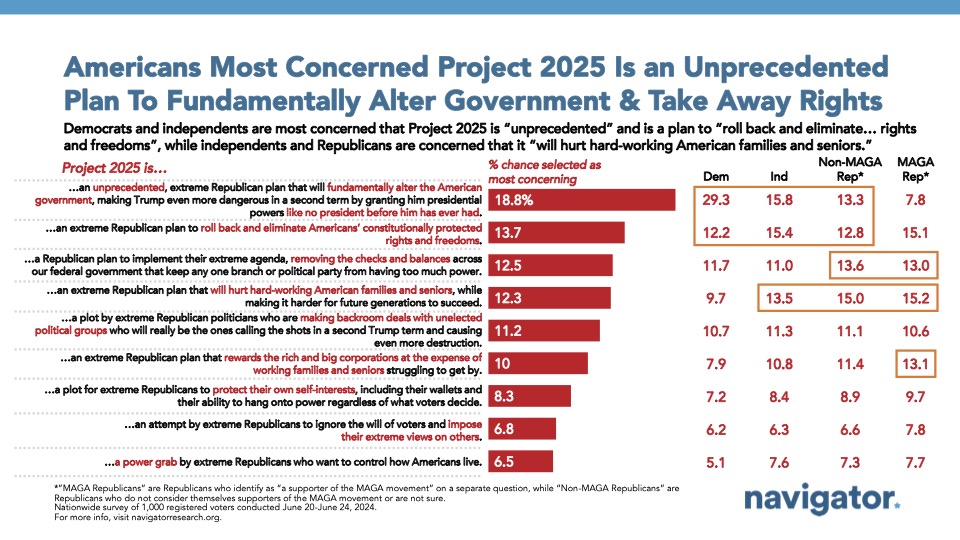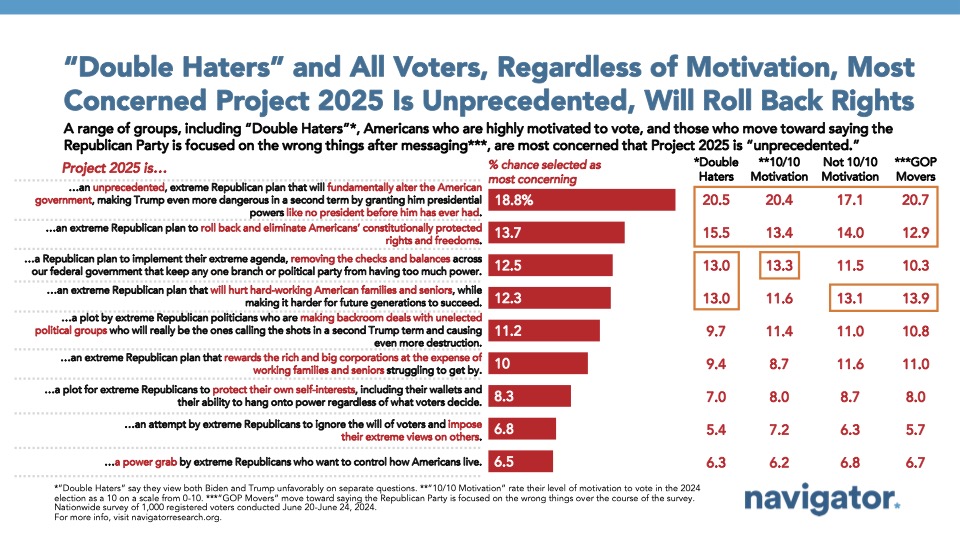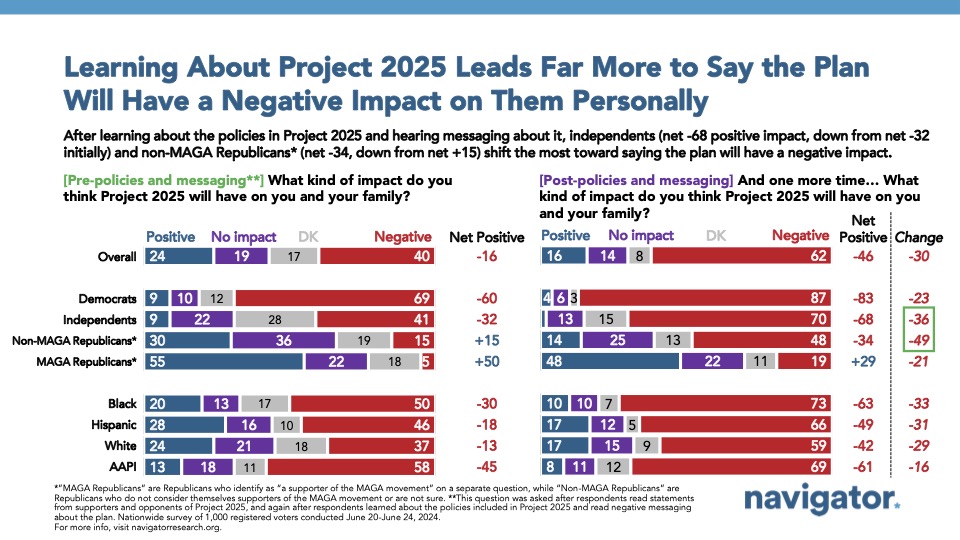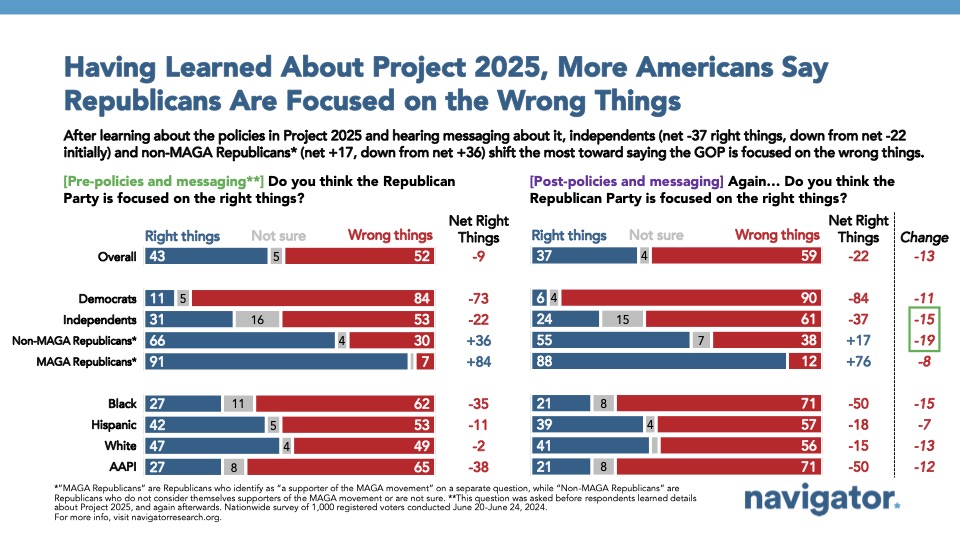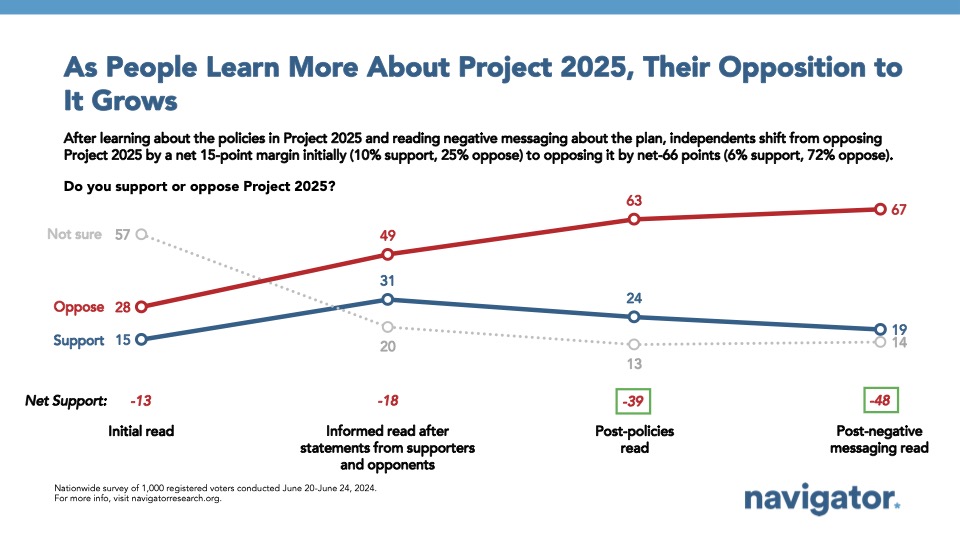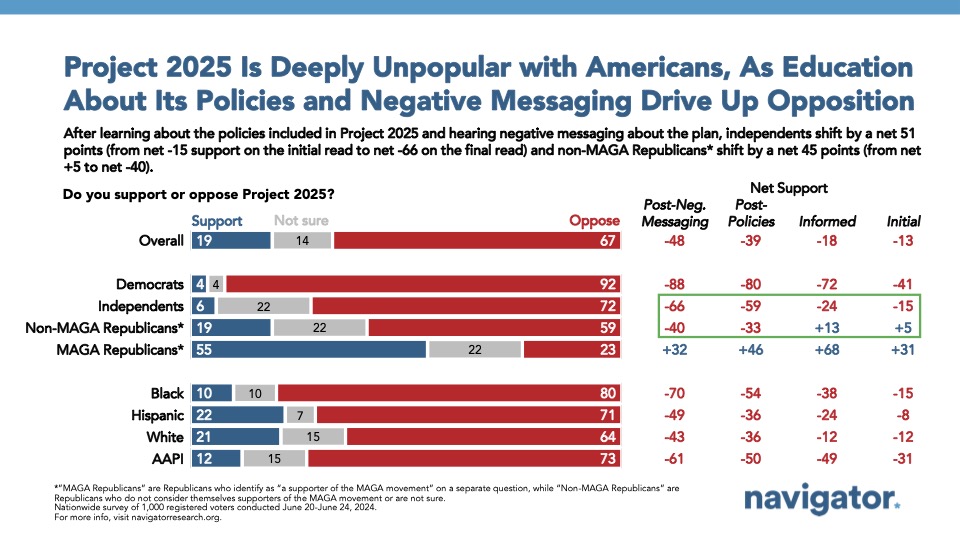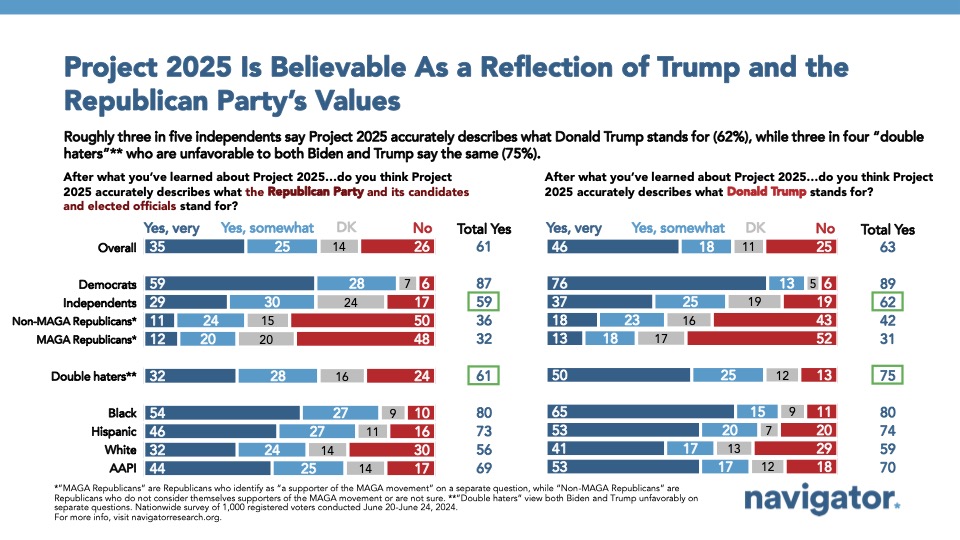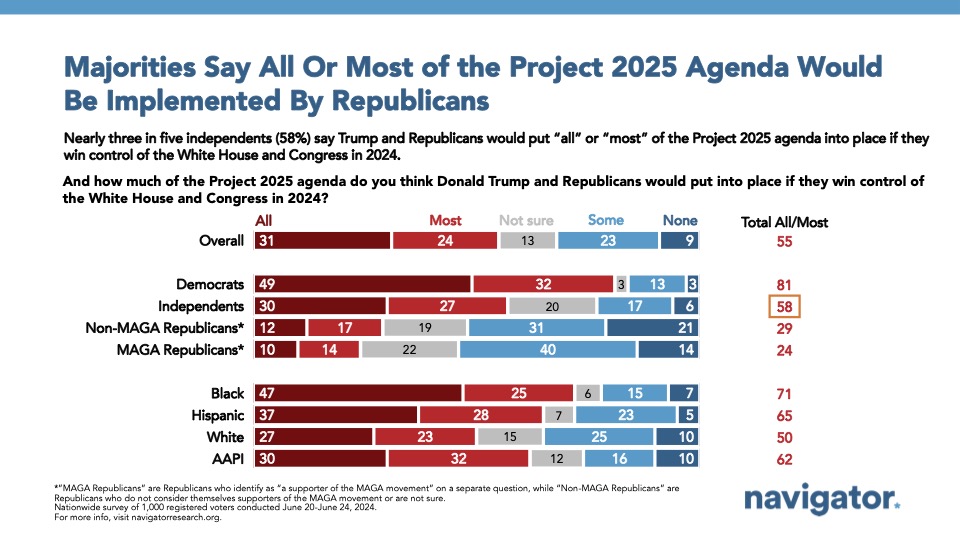Poll: Project 2025 and Its Impact
This Navigator Research report is the third and final of three releases on how Americans view Project 2025, the conservative blueprint for a second Donald Trump presidency. This release focuses on how to frame the most concerning messages Americans have about Project 2025 utilizing a “MaxDiff*” methodology (explained in more detail at the end of this newsletter), and what impact messaging has on Americans’ perceptions of whether Republicans are focused on the right things and the personal impact that Project 2025 would have on them. You can read our previous reports on how to brand Project 2025 here and how Americans evaluate the different policies of Project 2025 here.
Americans are most concerned that Project 2025 is an “unprecedented” plan that will give Trump powers that no other president has ever had.
The most concerning aspects of Project 2025 are that it is an unprecedented, extreme plan that will fundamentally alter the American government, and that it will roll back and eliminate Americans’ constitutionally protected rights and freedoms. In a MaxDiff exercise regarding a series of concerning statements about Project 2025, the most concerning statement focuses on the unchecked wielding of presidential power the policy proposals allow: “Project 2025 is an unprecedented, extreme Republican plan that will fundamentally alter the American government making Trump even more dangerous in a second term by granting him presidential powers like no president before him has ever had.”
- The second-most concerning statement about Project 2025 highlights how it threatens rights and freedoms: “Project 2025 is an extreme Republican plan to roll back and eliminate Americans’ constitutionally protected rights and freedoms.”
- The third-most concerning statement emphasizes how it would remove checks and balances from our system of government: “Project 2025 is a Republican plan to implement their extreme agenda, removing the checks and balances across our federal government that keeps any one branch or political party from having too much power.”
- Democrats are most concerned by the statement that Project 2025 is “an unprecedented, extreme Republican plan that will fundamentally alter the government,” while independents and Republicans who do not identify with the MAGA movement are concerned most by this as well as that it will “roll back and eliminate Americans’ constitutionally protected rights and freedoms.” Moreover, these two concerns are the most concerning among those who are unfavorable to both President Biden and former President Trump.
- Messaging about political fallout without naming the impacts on people are among the least concerning framings of Project 2025. The two statements that ranked lowest in this MaxDiff analysis included that Project 2025 is “a power grab by extreme Republicans who want to control how Americans live” and that it is “an attempt by extreme Republicans to ignore the will of voters and impose their extreme views on others.”
Education about Project 2025’s policies and negative messaging about the plan drive up opposition.
After learning about the policies of Project 2025 and messaging against it, three in five Americans believe Project 2025 will have a negative impact on them and their families, and think the Republican Party is focused on the wrong things. At the beginning of the survey before learning more about Project 2025, a plurality of Americans said they believed Project 2025 would have a negative impact on them and their family (net -16; 24 percent positive impact – 40 percent negative impact, with 36 percent who said it would have no impact or were not sure). By the end of the survey, there was a net 30-point shift toward the belief it would have a negative impact on them and their family (net -46; 16 percent positive impact – 62 percent negative impact, with 22 percent who said it would have no impact or were not sure). Nearly nine in ten Democrats (87 percent), seven in ten independents (70 percent), and about half of non-MAGA Republicans (48 percent) believed it would have a negative impact on them and their families after exposure to Project 2025’s policies and messaging.
- There was also a significant shift in Americans’ perceptions that the Republican Party is focused on the right things: at the beginning of the survey, the Republican Party was more likely to be seen as focused on the wrong things by a net 9 points (43 percent right things – 52 percent wrong things), and after messaging against 2025, there was a net 13-point increase in the share who believe the Republican Party is focused on the wrong things to 22 points underwater (37 percent right things – 59 percent wrong things), with independents shifting by a net 15 points from net -22 to net -37 (24 percent right things – 61 percent wrong things) and non-MAGA Republicans shifting by a net 19 points from net +36 to net +17 (55 percent right things – 38 percent wrong things).
- Reminder from our first report: Project 2025 is underwater by 48 points at the end of this survey (19 percent support – 67 percent oppose), with nearly three in four independents opposed to it (net -66; 6 percent support – 72 percent oppose) and Republicans split on the plan (net -2; 38 percent support – 40 percent oppose); more than nine in ten Democrats are opposed to Project 2025 by the end of the survey (net -88; 4 percent support – 92 percent oppose).
Three in five Americans believe that Project 2025 accurately describes what the Republican Party and Donald Trump stand for.
61 percent of Americans say Project 2025 accurately describes what the Republican Party stands for, including 87 percent of Democrats, 59 percent of independents, and even 34 percent of Republicans; a similar 63 percent share believe Project 2025 accurately describes what Donald Trump stands for. Those who are unfavorable to both Biden and Trump are significantly more likely to say that Project 2025 accurately describes what Donald Trump stands for (75 percent) than the Republican Party more generally (61 percent), and non-MAGA Republicans are also more likely to say Project 2025 accurately describes what Trump stands for (42 percent) than the Republican Party (36 percent).
- 55 percent of Americans think that Donald Trump and Republicans would put the Project 2025 agenda into place if they win control of the White House and Congress in 2024, including 58 percent of independents and 58 percent of those unfavorable to both Biden and Trump.
*MaxDiff Methodology: To find the most concerning message, Navigator used a methodology called “MaxDiff.” This approach is used in market research to understand consumer preferences when there is a list of items to consider. Instead of rating all items at once, respondents are presented with separate assortments of three messages and asked to choose the most and least concerning one. One benefit of the approach is that it allows researchers to differentiate between a large number of statements, even when they might receive similar scores if rated one-by-one. Importantly, the scores do not reflect how concerning each statement is in and of itself, but rather how concerning it is relative to the other statements tested in this exercise.
